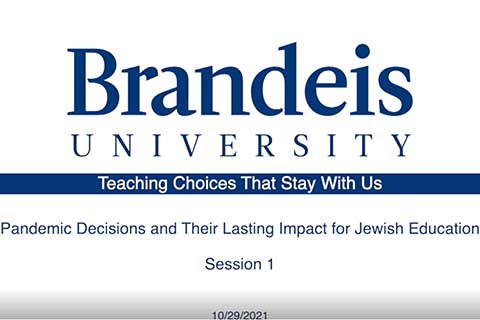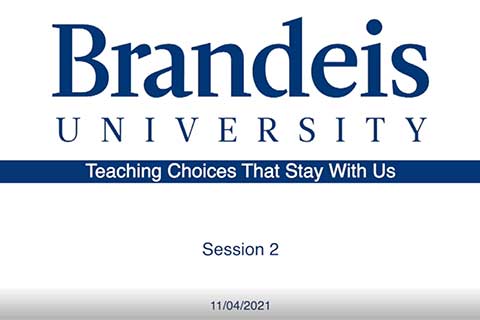Teaching Choices That Stay With Us: Pandemic Decisions and Their Lasting Impact for Jewish Education
In summer 2020, the Mandel Center with partial funding from the Lippman Kanfer Foundation for Living Torah, launched the Online Jewish Education project, a set of investigations of online teaching and learning in five diverse Jewish educational settings. During this two-day presentation, "Teaching Choices That Stay With Us: Pandemic Teaching Decisions and Their Lasting Impact for Jewish Education," the researchers of this study explored their findings and discoveries in discussions with study participants during five half-hour sessions, ending with a half-hour question-and-answer session.
Day One
Mindy Gold (EdtechMMG), Miriam Raider-Roth (Mandel Teacher Educator Institute), Elie Holzer (Bar Ilan University) with Esther Friedman (TanenbaumCHAT) and Laura Novak Weiner (HUC-JIR).
In this session, the presenters modeled an online iteration of line-by-line text study piloted in the summer of 2020, and then discussed how social, cognitive and teaching presence were enacted. They illustrated how planning online text study with the framework of these three presences, as well as the accompanying teacher facilitation moves, helped cultivate rich engagement and dialogue.
Joshua Ladon (Shalom Hartman Institute of North America) with Elana Stein Hain (Shalom Hartman Institute of North America)
How did a Talmud teacher translate her relational, beit midrash-focused Talmud class into a Zoom webinar for adult learners? This presentation illustrated the instructional strategies employed in an online Talmud class, and included a discussion with the educator, Elana Stein Hain, about her educational decisions.
Matt Reingold (TanenbaumCHAT), Amanda Strawhacker (Tufts University)
Jewish high school educator Matt Reingold adopted different models of online Zoom learning with his students for the 2020-21 school year, and used the opportunity to research how two classes engaged with the same Israel studies content in online vs. blended learning modalities. Qualitative results showed that meaningful learning occurred in both contexts, and further, offered insights about how engaging students in debates about controversial Israeli policies and current events complicates their nuanced relationship with Israel.
Day Two
Daniel Olson (National Ramah Commission), Erica Frankel ( Hillel International) with Rabbi Jonah Geffen (Hunter Hillel) and Leah Kahn (Hillel International)
This presentation explored how the critical closing moments, or "mic drops," of a class take on new weight online. The presenters shared their observations, and spoke to the creators of the JLF curriculum, and to a JLF educator, about what goes through their minds as they end a class online.
Discussing Bible in a Pre-K/1st Grade Full-Time Remote Classroom
Ziva Hassenfeld (Brandeis University) with Geraldine Bogard (Brandeis University) and Gavriella Troper-Hochstein (Brandeis University)
Professor and veteran teacher Ziva Hassenfeld, with the help of her SCRoLL Lab research team, embarked on self-study in this project, becoming a Tanakh teacher for a pre-K/1st grade remote class. This session explored the findings of their research on remote teaching but went one step further, opening up a conversation between Hassenfeld and her research team about what it was like to watch and implement her student-inquiry approach — in real-time — in a virtual classroom. Did it work? What questions were her undergraduate research assistants left with?

